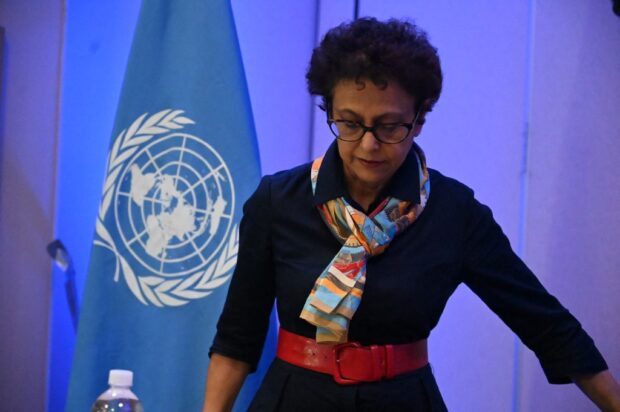
FILE PHOTO: UN Special Rapporteur on freedom of opinion and expression, Irene Khan, arrives to a press conference in Tegucigalpa, on October 27, 2023. The Department of Foreign Affairs (DFA) said the “government is confident” that through talks with local stakeholders, Khan will find out that freedom of expression is vibrant in the Philippines.(Photo by Orlando SIERRA / AFP)
MANILA, Philippines — The Department of Foreign Affairs (DFA) said the “government is confident” that through talks with local stakeholders, a United Nations (UN) special rapporteur will find out that freedom of expression is vibrant in the country.
MANILA, Philippines — The Department of Foreign Affairs (DFA) said the “government is confident” that through talks with local stakeholders, a United Nations (UN) special rapporteur will find out that freedom of expression is vibrant in the country.
UN Special Rapporteur on freedom of opinion and expression Irene Khan is set to visit the country from January 23 to February 2, the DFA has announced, adding that Khan would be coming to the country upon the invitation of the Philippines government.
According to the DFA, Khan’s visit is an opportunity for her “to appreciate the well-rooted and flourishing democracy of the Philippines, as the oldest democratic Republic in Asia, as seen in the vibrant media landscape and civic space.”
“The government is confident that through meaningful dialogues and meetings with government, media, civil society organizations, and other stakeholders, Ms. Khan will see for herself the transparency and progressive agenda of the government [concerning] the promotion and protection of freedom of speech and expression,” the DFA said in a statement Saturday.
It noted that Khan is the third UN special rapporteur to visit the Philippines in 14 months.
READ: DFA sees busy Q1 of 2024 as dignitaries set to visit PH
In December 2022, UN Special Rapporteur on the sale and exploitation of children Fatimah Singhateh visited the country while UN Special Rapporteur on climate change and human rights Ian Fry visited in November 2023.
“The Philippines cooperates in good faith with international human rights mechanisms, and supports funding for cooperation to build human rights capacities in developing countries,” the DFA reiterated.
READ: Before PH visit, UN rapporteur urged to probe ‘systemic attacks’ vs journos
“The Philippines takes pride in its human rights agenda, built over decades and across different administrations, which has set important benchmarks in the protection and promotion of the rights of various marginalized communities, including migrant workers, women, children, indigenous peoples, refugees, stateless persons, individuals with disabilities, and other vulnerable groups,” it added.